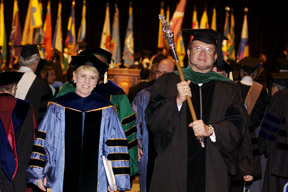The inauguration of U-M’s 13th president, Mary Sue Coleman, was celebrated as a day to “look back” and “reach forward.”

“The glory of the University of Michigan resides in its ability to reinvent itself continually, to cherish its roots while inventing the future,” Coleman said in the president’s address, during which she talked about the rich history of the University as well as the challenges that lie ahead.
The president used a symbol from Ghana (West Africa), known as the sankofa, as an illustration.
“The sankofa is a bird that is moving forward, while its head is turned backward,” Coleman said at the March 27 event. “The proverb associated with the symbolism of the bird is: ‘Look to your roots in order to reclaim your future.'”
The president acknowledged the contributions of past leaders, including two in attendance at the ceremony: James Duderstadt and Lee Bollinger. She extolled the values of a public university by quoting Thomas Jefferson and former University President James Angell. “‘The state and the University should feel their interests are identical,'” Coleman quoted Angell. “‘The prosperity of the University is bound up in that of the state. Michigan cannot grow stronger, wiser and happier without strengthening her principal seat of learning.'”
In looking forward, Coleman addressed challenges created by the growth of technology, which she said is “transforming all areas of learning.” She also talked of the University’s responsibility to the environment, to economic growth, and to maintaining ethical controls over science and technology.
“The University of Michigan has emerged as a leader in no small part because of its public character,” she said. “We will not be working alone. To address broader issues will require collaborations far beyond Ann Arbor, Dearborn and Flint. The University of Michigan can bring vast intellectual resources to bear in our resolve to work on behalf of society.”
Coleman’s theme of looking back while moving forward was echoed in the inaugural address delivered by James Jackson, director of the Center for Afroamerican and African Studies and the Daniel Katz Distinguished University Professor in Psychology. Jackson also used the sankofa imagery to make his point.
“These are challenging times—war in the Middle East, budget problems, increasing demands of expanding curricula to represent broad global and local community knowledge, as well professional and liberal arts learning opportunities, and the need to find the appropriate role of the University in the immediate economic and social good of state and nation.
“In order to move forward, we need to learn from the mistakes as well as the triumphs of the past, in constructing a forward-looking new agenda of the University of Michigan.”
In reference to the defense of affirmative action, coming before the Supreme Court April 1, Jackson said a continuing goal is “for all voices to be heard in this nation.”
“The University of Michigan has assumed a special place in America, recognizing the intellectual strengths in diversity, and extolling the need for higher education to be synonymous with inclusiveness, equal opportunity, and intellectual excellence in our culturally pluralistic and ever-changing land and peoples.”
Jackson used the poem “I, Too, Sing America” by Langston Hughes to frame his comments:
I, too, sing America.
I am the darker brother.
They send me to eat in the kitchen
When company comes,
But I laugh,
And eat well,
And grow strong.
Tomorrow,
I’ll be at the table
When company comes.
Nobody’ll dare
Say to me,
“Eat in the kitchen,”
Then.
Besides,
They’ll see how beautiful I am
And be ashamed
I, too, am America.
“Today we celebrate Mary Sue Coleman’s much-deserved formal ascension to a position of great trust, honor and responsibility,” Jackson concluded. “Using the past as guide, the future is neither simple nor sure; it is still to be written.
“Her scientific, professional and family experiences have equipped her for this moment. We could not have hoped for a better-prepared person to help us all understand our responsibilities, our strengths and the directions that need to be charted in order to move this great university forward, and to help give reality to the vision of a nation reminiscent of the immortal words of Langston Hughes, in which we all are America.”

